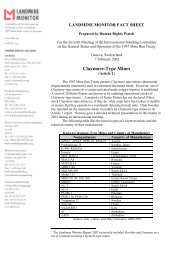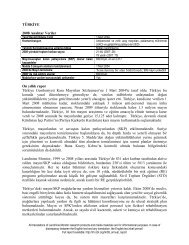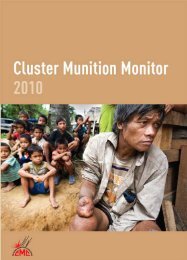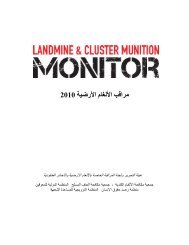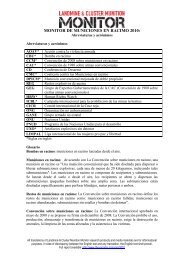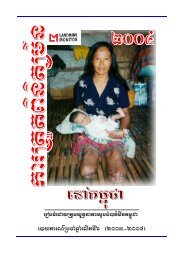Download PDF - Landmine and Cluster Munition Monitor
Download PDF - Landmine and Cluster Munition Monitor
Download PDF - Landmine and Cluster Munition Monitor
Create successful ePaper yourself
Turn your PDF publications into a flip-book with our unique Google optimized e-Paper software.
<strong>Cluster</strong> <strong>Munition</strong> <strong>Monitor</strong> 2012<br />
States Parties have taken steps to improve casualty data collection <strong>and</strong>/or needs assessments. Since entry into force<br />
of the Convention on <strong>Cluster</strong> <strong>Munition</strong>s, most have attempted to compile the information necessary to assist cluster<br />
munition victims, yet all failed to do so within the one-year target proposed by the Vientiane Action Plan except Albania,<br />
which already had the information in place. Afghanistan still did not have a needs assessment or data collection system<br />
in place as of mid-2012. In June 2011, BiH stated that it had identified previously unrecorded cluster munition casualties<br />
<strong>and</strong> in May 2012 it reported more casualties, but the data lacked specific details <strong>and</strong> was not fully disaggregated. 21<br />
Croatia continued efforts to compile data from several sources. The Lao PDR government recognized the poor quality<br />
of the data available in early 2012 <strong>and</strong> authorities introduced a “survivor tracking system” which made good progress in<br />
collecting information on needs by mid-2012. 22 The Lebanon Mine Action Center completed the first phase of a national<br />
victim survey <strong>and</strong> needs assessment in 2010, but data still had not been consolidated within a single national database by<br />
mid-2012. In September 2011, Mozambique said that it required international assistance to identify <strong>and</strong> survey cluster<br />
munition victims. Guinea-Bissau, Montenegro, <strong>and</strong> Sierra Leone have made no, or extremely limited, efforts to survey<br />
<strong>and</strong> assess the needs of cluster munitions victims.<br />
Some signatory states made progress in assessing the needs of cluster munition victims in 2011 <strong>and</strong> the first half<br />
of 2012. By mid-2012, Angola had completed needs assessments in four of its 18 provinces through a survey that<br />
began in October 2010. 23 In DRC, efforts to assess survivor needs continued in 2011 <strong>and</strong> 2012. 24 Iraq launched a needs<br />
assessment during 2011 that is to cover the 15 provinces of central <strong>and</strong> southern Iraq by February 2015. 25 In Colombia,<br />
no comprehensive needs assessment was conducted during the year but efforts were made to include new sources of<br />
information <strong>and</strong> to improve verification of data in the national victim database. 26 Ug<strong>and</strong>a, however, appeared to have<br />
made no efforts toward the goal of conducting a needs assessment in 2011.<br />
In non-signatory countries <strong>and</strong> other areas, little or no progress was recorded in 2011 with respect to assessing the<br />
needs of cluster munition victims. There was ongoing data collection in Cambodia <strong>and</strong> Georgia, but no progress was<br />
reported in assessing the needs of survivors, as in the past. A very limited survey pilot was conducted in South Sudan. In<br />
Western Sahara, a needs assessment was carried out in coordination with the local government in early 2012.<br />
Coordination<br />
The convention requires that States Parties with cluster munition casualties designate a focal point within the government<br />
to take responsibility for ensuring that victim assistance efforts are coordinated <strong>and</strong> that work is implemented. The focal<br />
point should be announced within six months of the convention’s entry into force for that State Party <strong>and</strong> should have the<br />
authority, expertise, <strong>and</strong> adequate resources to carry out its task.<br />
All States Parties with known cluster munition victims have designated a focal point for victim assistance activities<br />
as of 31 July 2012, except Afghanistan <strong>and</strong> Sierra Leone, which have no known cluster munition survivors but where<br />
many people have been disabled from conflict. In Montenegro, the Ministry of Foreign Affairs is the de facto focal point<br />
<strong>and</strong> has reported on victim assistance activities. 27 The Albanian Mine Action Center was transformed into the Albanian<br />
Mine <strong>and</strong> <strong>Munition</strong>s Coordination Office in 2011, which retains coordination responsibilities for victim assistance. 28<br />
The BiH Ministry of Foreign Affairs was declared to be the victim assistance focal point for the convention in 2011. 29 In<br />
Mozambique, the chief of the Department for Persons with Disabilities within the Ministry of Women <strong>and</strong> Social Affairs<br />
was listed as focal point for the convention rather than the National Demining Institute. 30<br />
Afghanistan, Albania, BiH, Croatia, Lao PDR <strong>and</strong> Lebanon have victim assistance coordination structures in place which<br />
either met regularly or effectively coordinated assistance, often in response to a particular issue or need. No improvements<br />
were identified in the coordination of victim assistance in Guinea-Bissau, Montenegro, Mozambique, or Sierra Leone.<br />
All signatory states with cluster munition victims had a designated victim assistance focal point in 2011, though of<br />
the six, only the Colombian focal point—Mine Action Program (PAICMA)—could be described as effective. Victim<br />
assistance coordination throughout Iraq improved in 2011. 31<br />
21<br />
Statement of BiH, Convention on <strong>Cluster</strong> <strong>Munition</strong>s Working Group on Victim Assistance, Geneva, 16 April 2012; <strong>and</strong> Statement of BiH,<br />
Convention on <strong>Cluster</strong> <strong>Munition</strong>s Intersessional Meeting, Session on Victim Assistance, Geneva, 28 June 2011.<br />
22<br />
“Deputy PM calls for more detailed register of UXO victims,” 2 February 2012. laovoices.com/deputy-pm-calls-for-more-detailed-registerof-uxo-victims/.<br />
23<br />
CNIDAH, “Relatório Anual de Actividades de 2011,” (“Annual Activity Report 2011”), Lu<strong>and</strong>a, March 2012, p. 13.<br />
24<br />
Response to <strong>Monitor</strong> questionnaire by Louis Ibonge Numbi, Victim Assistance Focal Point, Ministry of Social Affairs, Kinshasa, 25 May<br />
2012; “Mapping of Mine Action VA Project in DRC,” UNMACC, 24 March 2011.<br />
25<br />
Statement of Iraq, Mine Ban Treaty St<strong>and</strong>ing Committee on Victim Assistance <strong>and</strong> Socio-economic Reintegration, Geneva, 23 May 2012.<br />
26<br />
Response to <strong>Monitor</strong> questionnaire by Sonia Matilde Eljach Polo, Director, Multilateral Policy Issues, Ministry of Foreign Affairs, 19 April 2012.<br />
27<br />
See Statement of Montenegro, Convention on <strong>Cluster</strong> <strong>Munition</strong>s Working Group on Victim Assistance, Geneva, 16 April 2012. Various<br />
government ministries have responsibilities for protecting the rights of persons with disabilities. US Department of State, “2011 Country<br />
Reports on Human Rights Practices: Montenegro,” Washington, DC, 24 May 2012.<br />
28<br />
Interview with Veri Dogjani, Albanian Mine <strong>and</strong> <strong>Munition</strong>s Coordination Office (AMMCO), Geneva, 24 May 2012.<br />
29<br />
BiH, Convention on <strong>Cluster</strong> <strong>Munition</strong>s Article 7 report, (for Calendar year 2011) Form H, April 2012.<br />
30<br />
Mozambique, Convention on <strong>Cluster</strong> <strong>Munition</strong>s Article 7 report (for the period 1 September 2011 to 31 May 2012), Form H, July 2012.<br />
31<br />
Statement of Iraq, Mine Ban Treaty St<strong>and</strong>ing Committee on Victim Assistance <strong>and</strong> Socio-economic Reintegration, Geneva, 23 May 2012;<br />
interviews with Maythem Obead, Head of Community Liaison Department, DMA; Bakshan Asaad, Head of Rehabilitation Department,<br />
Kurdistan Ministry of Health; <strong>and</strong> Soran Majeed, Mine Victim Assistance Officer, General Directorate of Mine Action (GDMA) for Iraqi<br />
Kurdistan, Geneva, 21 May 2012.<br />
56



